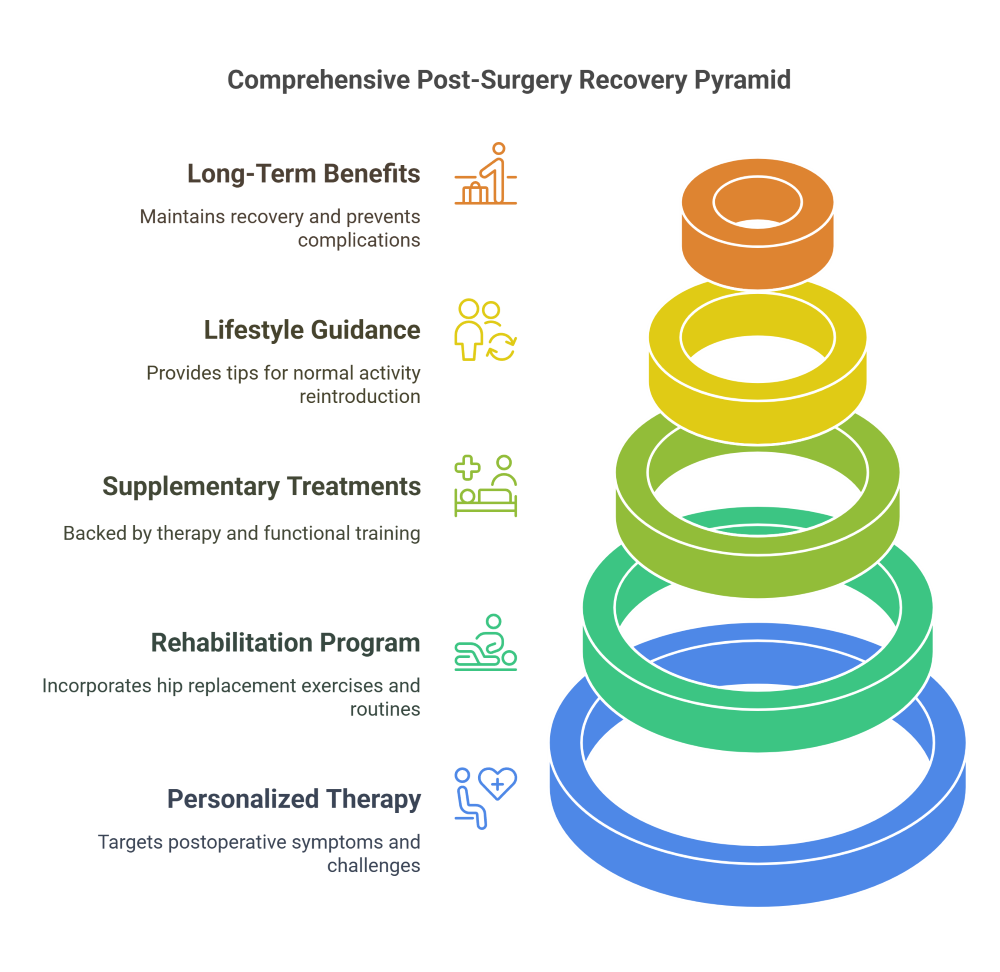Physical Therapy For Total Hip Replacement
Total hip replacement recovery can be challenging for most people. We make this transitional phase comfortable by teaching you total hip replacement pain management techniques and exercises to relieve pain, improve joint mobility, and maximize the range of motion.
At Specialized Physical Therapy, we support your road to recovery with a personalized approach that accommodates all your needs.
Overview
Arthritic damage, fractured hip bones, and degenerative wear and tear are common causes for signing up for total hip replacement surgery. Always consider it as a final resort if physical therapy and non-surgical treatments do not work.
Surgeons remove damaged and deteriorated parts of your hip joint. These are replaced with artificial bones (made from metal or ceramic). The constructed joint comes with a ceramic or metal stem and ball that functions as your new femur. Additionally, the ball-and-joint socket gets replaced by plastic, metal, or ceramic covering.
The total hip replacement recovery process can turn tedious and problematic. We turn things around for patients by offering clear and effective instructions to restore joint mobility, flexibility and alleviate post-surgical pain.
Total Hip Replacement Symptoms
Postoperative hip pain and complications are part of the healing process.
Common total hip replacement symptoms and side effects include:
- Dull ache or throbbing pain in the surrounding area
- Redness and inflammation around the surgery site
- Stiffness and difficulty in movement
- Bruising and soreness near the replaced hip joint
These symptoms tend to subside within a few weeks.
If the problems persist, you might need to consult a professional. It becomes necessary when you experience tenderness, swollen muscles, and continuous leg pain.
Causes
Reasons to undergo total hip replacement surgery include:
- Crippling arthritis pain
- Traumatic hip injury
- Fractured hip bones
Surgical procedures become necessary when the body stops responding to non-surgical treatments (like physical therapy and medication). The new placement offers pain relief and allows you to enjoy a full range of motion.
Our total hip replacement exercises and rehabilitation techniques make this transition easier and pain-free.
Diagnosis
We do a detailed physical examination of your replaced hip. The initial appointment revolves around a comparative analysis of your medical history and current condition. We ask you a series of questions related to postoperative pain patterns and recurring symptoms.
Moreover, we might ask you to perform functional activities (like walking, climbing stairs, standing, etc.) These tests can help determine how much you have recovered and what you need to reach a prior level of functioning. We also consider skin integrity and scarring post-operation to give you a comprehensive understanding of the situation.
Once we have discussed the matter, we develop a goal-oriented total hip replacement program for rehabilitation.
Total Hip Replacement Treatment
We develop a personalized physical therapy plan focusing on your postoperative symptoms. This strategy addresses physical limitations, weaknesses, and challenges you’d like to overcome. Our primary focus is on reducing hip pain, increasing endurance, maximizing muscle strength, and working on individual endurance levels.
Our rehabilitation program includes total hip replacement treatment exercises like stretching and muscle strengthening routines, along with the NEUBIE to help accelerate the healing process. These facilitate your transition into daily routine activities after surgery.
These home exercises are backed by massage therapy, manual therapy, and mobilization sessions. Additionally, we offer functional training and gait and balance assessments. These are a vital part of your recovery process. We teach you how to adapt to the new routine progressively instead of pushing yourself to do things you once loved.
Our practical suggestions ensure that you know how to return to regular activities and leisure sports after a hip injury.
Apart from this, total hip replacement exercises accelerate natural recovery post-surgery and prevent relapse.

Get in touch with us today to begin your Hip Replacement Therapy. We are conveniently located in Fair Lawn, NJ. Call us at 201-773-8851 or contact us to schedule appointment.

